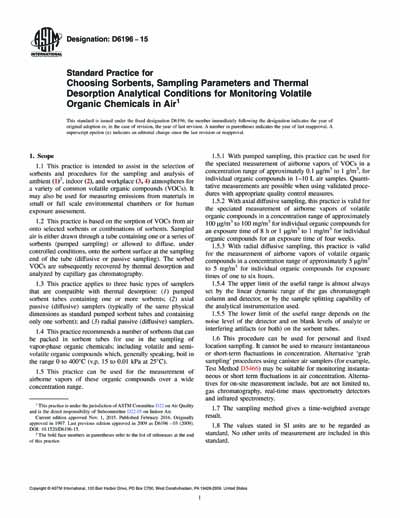Historical
ASTM D6196-15
Standard Practice for Choosing Sorbents, Sampling Parameters and Thermal Desorption Analytical Conditions for Monitoring Volatile Organic Chemicals in Air
1.1 This practice is intended to assist in the selection of sorbents and procedures for the sampling and analysis of ambient (1)2, indoor (2), and workplace (3, 4) atmospheres for a variety of common volatile organic compounds (VOCs). It may also be used for measuring emissions from materials in small or full scale environmental chambers or for human exposure assessment.
1.2 This practice is based on the sorption of VOCs from air onto selected sorbents or combinations of sorbents. Sampled air is either drawn through a tube containing one or a series of sorbents (pumped sampling) or allowed to diffuse, under controlled conditions, onto the sorbent surface at the sampling end of the tube (diffusive or passive sampling). The sorbed VOCs are subsequently recovered by thermal desorption and analyzed by capillary gas chromatography.
1.3 This practice applies to three basic types of samplers that are compatible with thermal desorption: (1) pumped sorbent tubes containing one or more sorbents; (2) axial passive (diffusive) samplers (typically of the same physical dimensions as standard pumped sorbent tubes and containing only one sorbent); and (3) radial passive (diffusive) samplers.
1.4 This practice recommends a number of sorbents that can be packed in sorbent tubes for use in the sampling of vapor-phase organic chemicals; including volatile and semi-volatile organic compounds which, generally speaking, boil in the range 0 to 400°C (v.p. 15 to 0.01 kPa at 25°C).
Content Provider
ASTM International [astm]






